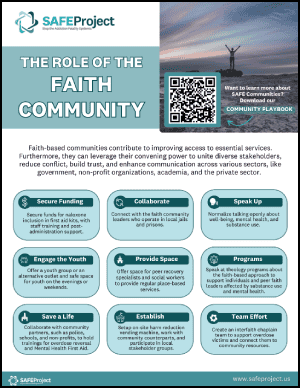Providing Helpful Resources to Diverse Communities
Faith-based institutions are an integral component to every community, they can contribute to improving access to essential services, like providing cooling and heating centers in extreme weather conditions, bridging gaps in services, like offering food or counseling, and fostering social connection. With substantial physical assets (i.e. buildings, land), as well as social capital, they are a trusted entity for many and have the influence to impact behavior change, support marginalized groups, raise awareness, guide masses, advance community priorities, aid in the implementation of programs and services, and champion community priorities.
Faith-based options offer a unique approach to substance use disorder recovery by incorporating spiritual teachings, community support, and holistic principles into the healing process. While these programs may not be suitable for everyone, they can provide a source of hope, strength, and resilience for individuals seeking a deeper connection to their faith as they journey toward sobriety.
Ways to Engage:
- Normalize Open Conversations: Encourage open discussions about well-being, mental health, and substance use within congregations and community forums.
- Educational Outreach: Visit theology programs to discuss faith-based approaches to well-being with students interested in working with impacted individuals.
- First Aid and Naloxone Training: Secure funding for naloxone and incorporate it into first-aid response kits. Train staff to administer naloxone with follow-up support for overdose incidents.
- Hosting Training Programs: Conduct overdose reversal and Mental Health First Aid training in collaboration with community partners like police departments, schools, and non-profit organizations.
- Collaborate with Peers: Engage with other faith leaders to share innovative approaches and strategies for supporting individuals affected by substance use.
- Provide Space for Support Services: Offer facilities for peer recovery specialists and social workers to deliver regular services as well host meetings and provide place based services
- Facilitate Peer-Led Groups: Host peer-led recovery meetings and create inclusive spaces that promote connection and acceptance.
- Parent Guardian Education: Educate parents and guardians on safe storage and disposal practices for medications.
- Community Resource Linkage: Help normalize conversations about alcohol and substance use while reducing stigma by providing educational resources.
- Interfaith Emergency Response: Organize and train an interfaith chaplain response group to provide counseling and support during emergency overdose calls.
- Community Conversation and Resource Sharing: Help normalize conversations about alcohol, tobacco, substance use while reducing stigma by providing educational resources.
- Youth Engagement: Offer safe spaces and youth groups during evenings and weekends to engage youth in positive activities and discussions.
- Harm Reduction Initiatives: Collaborate with community counterparts to establish harm-reduction vending machines on-site.
- Stakeholder Engagement: Participate in community coalitions and stakeholder groups to align efforts and share resources.
- Resource Distribution: Share recommended reading lists and connect congregations with community-based resources for substance use disorders.
- Support for Incarcerated Populations: Connect with faith community leaders operating in local jails and prisons to provide support and resources for individuals struggling with addiction.
- Recovery Ally Training: Words matter when supporting someone during their journey. We need to help shift the conversation surrounding recovery.
Resources For Unhoused Individuals
Homeless and Housing Resource Center (HHRC): The Central Hub for Resources
Faith-Based Organizations Fundamental Partners in Ending Homelessness
Resources for Faith-Based Recovery
- “Addiction and Faith” by Dale Ryan and Juanita Ryan
- Compassion in Action: A Guide for Faith Communities Serving People Experiencing Mental Illness and Their Caregivers
- Hazelden Betty Ford Foundation’s Faith Resources
- Faith & Community Roadmap to Recovery Support
- The Opioid Crisis Practical Toolkit
- The Partnership Center Toolkit
- SAMHSA Faith-Based and Community Initiatives
Once you choose hope, anything's possible.Christopher Reeve




